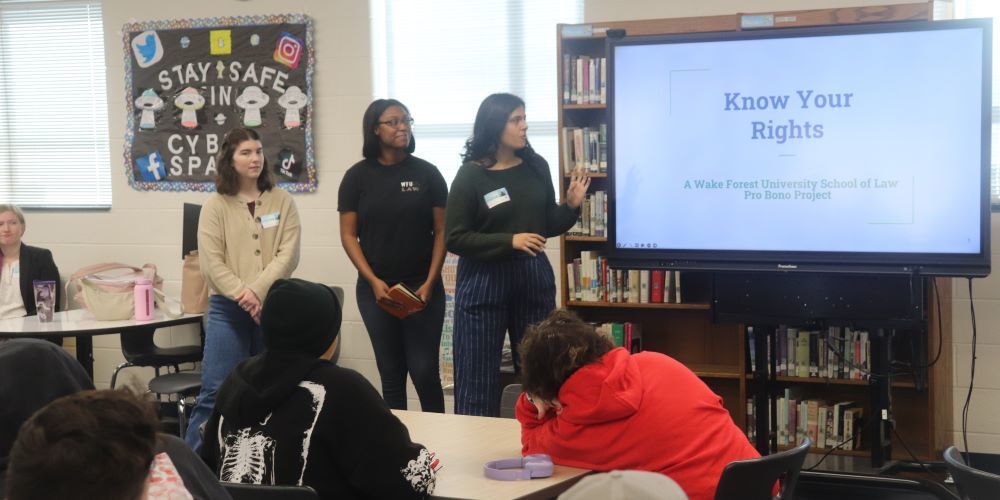Students at East Forsyth High School got a lesson in the importance of understanding their civil liberties during a presentation from law students at Wake Forest University.
 “Know Your Rights” is a presentation centered on rights guaranteed to Americans, specifically students, through the US Constitution and other applicable laws. Legal protections are a bit different on school campuses and during classes than they are in general society, and schools have a high degree of authority to add extra rules that are treated as law, such as dress codes and discipline for disruptive activities. Navigating the differences can be confusing, but doing it well can save students a lot of trouble.
“Know Your Rights” is a presentation centered on rights guaranteed to Americans, specifically students, through the US Constitution and other applicable laws. Legal protections are a bit different on school campuses and during classes than they are in general society, and schools have a high degree of authority to add extra rules that are treated as law, such as dress codes and discipline for disruptive activities. Navigating the differences can be confusing, but doing it well can save students a lot of trouble.
Presenters discussed examples like student protests, traffic stops, requests to search a bag, and other common legal interactions teenagers might encounter to give students a better understanding of real-world situations when they need to know their rights. They also brought up gray areas that require extra thought about potential consequences – for example, social media and cyberbullying add nuances to harassment and bullying laws that most schools and governments are still adapting to.
“While there are no sure guidelines about how schools can regulate things outside of school hours, it’s generally allowed that schools can discipline students if it results in bullying or harm to another student, or if it occurs on school grounds, even outside of school hours,” said Kaitlin Beckom from Wake Forest.
 While the full scope of a student’s civil rights can’t be captured in one class session, attendees at the presentation left with a long list of resources to draw from. Everyone received a pocket constitution that they can consult with questions, and if they ever find themselves in situations where they feel their rights have been violated, they were given information they can use to contact organizations like the American Civil Liberties Union or the Pro Bono Project at Wake Forest. Multiple law professors from Wake Forest were also available to answer clarifying questions, including retired Juvenile Court Judge Denise Hartsfield.
While the full scope of a student’s civil rights can’t be captured in one class session, attendees at the presentation left with a long list of resources to draw from. Everyone received a pocket constitution that they can consult with questions, and if they ever find themselves in situations where they feel their rights have been violated, they were given information they can use to contact organizations like the American Civil Liberties Union or the Pro Bono Project at Wake Forest. Multiple law professors from Wake Forest were also available to answer clarifying questions, including retired Juvenile Court Judge Denise Hartsfield.
The program coincides with Black History Month, and Social Studies Teacher Alexis Callender says it’s an appropriate time to teach students about their rights. She says that Friday’s students are very aware of the state of the world and want to do their part to make their communities better. Knowing their rights means knowing more specifically how to promote positive change the way that the activists of the past did.
 “A big cornerstone of Black History is the Civil Rights Movement and protests and things like that, and we are in a climate where we have more students who are active in those types of civic engagement,” Callender said. “You want your students to be able to engage in that, but we also want them to know their rights and to be able to do that in a way that is safe.”
“A big cornerstone of Black History is the Civil Rights Movement and protests and things like that, and we are in a climate where we have more students who are active in those types of civic engagement,” Callender said. “You want your students to be able to engage in that, but we also want them to know their rights and to be able to do that in a way that is safe.”
East Forsyth always goes all out for Black History Month, and there are dozens of guest speakers, artistic performances, and cultural demonstrations planned for the rest of February. Principal Rusty Hall is proud of the way his school brings history to life, and he enjoys seeing students of all backgrounds learn something new and relevant about the world by bonding over culture.
“One of my goals here is that every student feels connected, and every student feels like a part of it,” Hall said. “All of our celebrations are about culture and what we can learn from it.”

